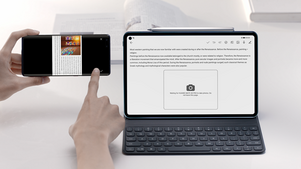Give your productivity a massive boost in 2021 with smart multi-devices powered by EMUI 11

Living in this hyper connected world, you probably have a few smart connected devices that you use daily. Smartphones naturally come to mind – after all they’re the primary tool we use to stay connected with loved ones and colleagues at work. As the cornerstone of modern productivity, notebooks are still integral to our professional lives, and they, too, come with a suite of smart features. Between the two, there’s the tablet. Offering a much bigger screen than smartphones and a more intuitive user experience than a lot of PCs do, tablets are perfect for things like watching a film, sketching and reading an eBook. All these different devices have their own niches, fitting into different roles as we use them in our daily lives.
But change is in motion. Huawei, a pioneer in enabling cross-device functionality in smart devices, is committed to creating a future where content can flow seamlessly from device to device. In this vision, individual products cease to be the one factor determining the user experience. Instead, consumers are free to tailor the experience for themselves by seamlessly integrating products and services into “super devices” which can tap into all the capabilities of its constituents, and become something greater than the sum of their parts.
In pursuit of this future, Huawei has been working tirelessly to cultivate its 1+8+N ecosystem, a diverse range of first and third products that are built to work with each other, connected via Huawei technology. The smartphones, notebooks and tablets, mentioned at the start of the article are all included in this expansive ecosystem. At present, Huawei smartphones, laptops and tablets all support some degree of interoperability, but Huawei is about to take it to the next level with a new EMUI 11 update for its tablet product range.
Whereas now a lot of people treat smartphones, tablets and notebooks as independent siloes, the EMUI 11 update will empower Huawei tablets with new capabilities that allow them to seamlessly interact with other devices, and thus offer new conveniences and experiences that were never before available.
The new smart productivity features on EMUI 11 take cross-device support even further than before. Introduced with EMUI 10, Multi-screen Collaboration lets you put the smartphone’s screen on another device with a bigger screen. With it, users can easily transfer various types of files simply by dragging items across the UIs, share a clipboard and also flexibly use the peripherals of either devices to get things done. For instance, an audio clip saved on the smartphone can be played back using the tablet’s more powerful speakers. EMUI 11 expands your multitasking capabilities with the improved Multi-screen Collaboration feature. What’s new with this is that it lets you launch an app from the smartphone and show it on the tablet screen, and then use the smartphone for other things simultaneously.
With the new Multi-screen Collaboration, you can use an app with the device of your choosing, regardless of where it is being run, all the while enjoying the flexibility to multi-task with two different devices. Another benefit of this is privacy. Imagine that you’re at a presentation, and you’re showing some slides saved in your smartphone using a tablet’s screen via Multi-screen Collaboration. If a message comes in, you can quickly read it on the smartphone without interfering with what’s being showed on the tablet.
Beyond Multi-screen Collaboration, Multi-window has also been improved to support window resizing. They work together with floating windows, which EMUI 11 supports up to two at once, to take full advantage of the larger screen for multi-tasking needs. Up to 10 apps can also be minimised to an App Bubble with a tap of a button. Apps minimised in this fashion can be quickly resumed, so you don’t have to go back and forth between the Home screen and the apps you’re working with.
EMUI 11 also comes with new features for existing productivity tools. The native Notepad app has been given some visual enhancements for better overall usability. Text in the subject line is now bolded for emphasis, and the list of notes are now put against a background with a gradient effect, improving readability. In terms of new features, Notepad now supports text extraction: you can now scan a document and convert printed copies into machine-encoded text for easy editing. On top of that, leveraging Huawei’s distributed technology, you can now easily insert images into a note on the tablet by snapping a photo with a smartphone. To protect your privacy, each individual note can be locked, requiring you re-authenticate your identity by using the PIN or biometrics before the note can be viewed. These notes can also be synced to the cloud, so you can access them across all your Huawei devices.
The latest EMUI update for Huawei tablets also brings new synergy with WPS Office. With the update, you can open up to 50 documents simultaneously, great for when you need to refer multiple documents when drafting your own content. These documents can be flipped through easily by using the WPS Office widget on the right side of the screen.
EMUI 11 brings many enhancements to the already stellar user experience Huawei tablets have to offer. Eager to try them out for yourself? Stay tuned with further announcements and visit https://consumer.huawei.com/en/emui-11/ to learn more.







